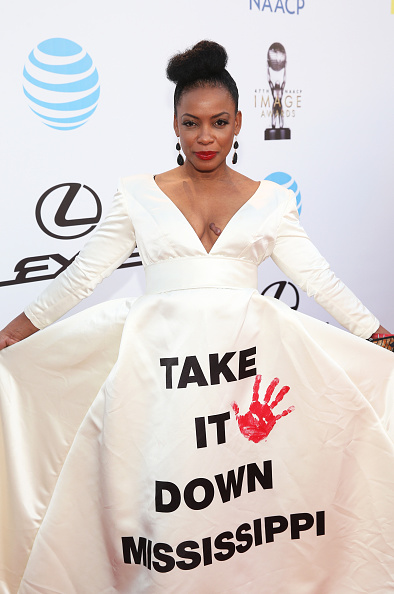
Watch. It only happens once, but it’s there.
It’s Super Bowl 25, and Whitney Houston is giving the performance of the “Star Spangled Banner” that would become the defining rendition for generations. Fighter jets fly across the sky as she leaves the podium in triumph. It seems America has just presented its best to the world. And yet there it is: the thematic stutter in the patriotic grandeur, the glitch, the poltergeist—the flag of the Ku Klux Klan, the flag of the State of Mississippi.
This year as Marlee Matlin signed “America the Beautiful,” viewers on social media registered shock and anger upon seeing the flag. The NFL seems to accept the presence of the Confederate flag as a part of the bargain of Mississippi statehood, treating the state like a beloved uncle that we keep at the family table while we overlook his proud storehouse of Jim Crow and carnage.
Unbowed after the massacre at Mother Emmanuel AME Church in Charleston, S.C., last June Governor Phil Bryant has insisted that the flag will remain the same. Many Mississippians believed that the state legislature this session would vote to change it. That did not happen. Several bills were written, and they were all killed in committee. To compound the insult, Bryant recently designated April as Confederate History Month. His position of the Mississippi leadership is clear: The flag will endure.
If the NFL continues to fly the flag of the State of Mississippi, it will be telling the up to 70% of its players who are African American that it condones state-sponsored terror against them; that it condones laws that prevented them from getting an education, from marrying whomever they choose, from voting. It will be affirming that it condones a culture that lynched up to 600 bodies like theirs for sport. If the NFL continues to fly a flag which roots itself in no uncertain terms in the propagation of the plantation economy, it is telling its players and its fans and the world that the football field is no better than a modern day cotton field.
This is a blight on the NFL. Furthermore this is a blight on America.
This country is held moral prisoner by Mississippi’s intractability. Why do we allow this? Why won’t we take a stand? Is the prospect of Mississippi’s embarrassment of having its flag excluded from the Super Bowl or our Capitol building more important than this nation’s stated morality? How can we shame Donald Trump for not disavowing the KKK when we, as a nation, will not do the same?
Many said it was the easiest thing for Trump to do—to disavow the KKK. And so he did, with two words in a tweet, ”I disavow.” Words. Mere words. President Barack Obama disavowed the KKK, the Confederacy, and the flag they share when he gave the poignant eulogy for Reverend Clementa Pinckney of Mother Emmanuel. Again, words.
And yet at this moment, the flag of the KKK hangs on our Capitol building, and all of us, not just Mississippians, pay for its purchase. In the same way that the United States led the process of denazification in Germany after World War II, it is time now that Obama sends a bill to Congress outlawing the flag of the KKK and the Confederacy from being flown on all federal property.
If we do nothing, our nation’s Capitol will continue to bear the litter of the Confederacy and the KKK, and our moral battle, if not our physical battle, with the groups like ISIS will remain hollow. If we do nothing, we will not only continue to be complicit with Mississippiʼs terrorism and its manifestation in mass murderers like Dylann Roof, we will also be an accomplice. If we do nothing, the next time a diva sings to the world, releasing American butterflies of dreams and democracy, there will still be that ghost, that Confederate ghost, wielding an ax limned with the dried and fresh blood of terror, perched and ready to hack every wing.
More Must-Reads from TIME
- Why Trump’s Message Worked on Latino Men
- What Trump’s Win Could Mean for Housing
- The 100 Must-Read Books of 2024
- Sleep Doctors Share the 1 Tip That’s Changed Their Lives
- Column: Let’s Bring Back Romance
- What It’s Like to Have Long COVID As a Kid
- FX’s Say Nothing Is the Must-Watch Political Thriller of 2024
- Merle Bombardieri Is Helping People Make the Baby Decision
Contact us at letters@time.com